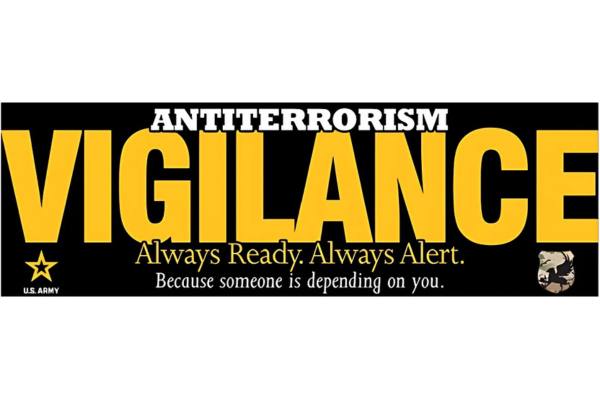The Importance of Antiterrorism Awareness for Retired Soldiers
By U.S. Army Office of the Provost Marshal General, Antiterrorism Division August 2025
Retired Soldiers, having dedicated a significant portion of their lives to national security, possess a unique understanding of potential threats and vulnerabilities. Their training and experience make them valuable assets in the ongoing effort to combat terrorism. Maintaining antiterrorism awareness is not only a matter of personal safety for these veterans but also a civic responsibility.
Retired Soldiers are often familiar with military installations, security protocols, and common indicators of suspicious activity. This knowledge can be invaluable in identifying and reporting potential threats in their communities. They may also be more likely to recognize the subtle signs of radicalization or recruitment efforts within their social circles. Their past experiences can also aid them in quickly assessing a situation and taking appropriate action, whether it's reporting suspicious behavior or activity to law enforcement or helping those in need.
Moreover, Retired Soldiers often maintain close relationships with active-duty personnel and military communities. This connection can facilitate the flow of information regarding potential threats or security vulnerabilities. Their insights can help bridge the gap between the military and civilian sectors, fostering a more cohesive and effective national security enterprise. In an age where threats can evolve rapidly, this continued vigilance and awareness is crucial.
The threat of terrorism extends beyond traditional battlefields. Retired Soldiers can play a key role in community-based initiatives aimed at preventing violent extremism. They can volunteer in local organizations, participate in neighborhood watch programs, or mentor young people who may be vulnerable to radicalization. By staying informed and engaged, Army veterans can help build resilience within their communities and reduce the appeal of extremist ideologies.
In addition to their community involvement, Retired Soldiers must also prioritize their personal security. Terrorists may target individuals with military backgrounds due to their perceived symbolic value or specialized knowledge. Therefore, it is essential for Retired Soldiers to remain vigilant in their daily lives, practice situational awareness, and take precautions to protect themselves and their families. This includes being mindful of their online presence, avoiding the disclosure of sensitive information, and reporting any suspicious activity they encounter.
Continuing education and training are also vital for Retired Soldiers. Antiterrorism tactics and strategies are constantly evolving, and it is important for veterans to stay abreast of the latest developments. Army installation antiterrorism officers can help to keep Retired Soldiers informed through antiterrorism awareness outreach programs.
In conclusion, Retired Soldiers possess a unique combination of skills, knowledge, and experience that makes them invaluable assets in the fight against terrorism. Their continued awareness, vigilance, and community involvement are essential for protecting both themselves and the nation. By staying informed, remaining engaged, and prioritizing personal protection measures, these veterans can continue to serve their country long after they have left active duty.

